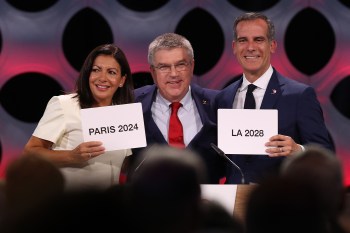The economics of winning an Olympics
The International Olympic Committee will announce the host for the Summer Games of 2020 tomorrow. With high unemployment in Madrid, worries over nuclear radiation in Tokyo, and protests and refugees in Istanbul, all three finalists are cities facing economic uncertainty.
The Olympics may bring in a lot of money from tourism, but they’re also incredibly expensive to put on. Brad Humphreys, an economist at West Virginia University, says the Games are sometimes unaffordable for the cities competing to host them. “The most important factor the IOC is taking into account,” he says, “is that the host city or region can actually pay for all the goodies that they promise to build.”
Yet the bidding process is set up to extract as much money from the hosts as possible, he says, as cities compete with pledges to build bigger, better, newer.
Sports economist Victor Matheson suggests that host cities’ economic interests are directly opposed to those of the IOC. The Olympic Committee favors bids that promise lavish new stadiums and high spectacle – ideal for boosting viewership and broadcast revenue – while cities have every incentive to use existing facilities in order to minimize their overhead.
“Any bid that’s likely to make economic sense is unlikely to get chosen by the IOC,” Matheson says, “and any bid that is likely to be chosen by the IOC is very unlikely to make economic sense.”
Matheson, who teaches at the College of the Holy Cross and contributes to The Sports Economist, says the Olympics are good for construction companies and bad for taxpayers.
Citing Athens in 2004, Humphrey says, “Now I’m not saying it caused the economy to collapse, but they had a lot of debts associated with hosting those Games. I think the Olympic debt didn’t help ‘em any in Greece.”
Whether it makes economic sense or not, a heroic narrative could come in handy for the bid, Humphreys says. “The IOC is all about that narrative, overcoming adversity and succeeding,” he says. And that’s something all three finalists have in common.
There’s a lot happening in the world. Through it all, Marketplace is here for you.
You rely on Marketplace to break down the world’s events and tell you how it affects you in a fact-based, approachable way. We rely on your financial support to keep making that possible.
Your donation today powers the independent journalism that you rely on. For just $5/month, you can help sustain Marketplace so we can keep reporting on the things that matter to you.


















